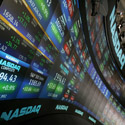
You may already have read this news in the newspapers or watched on the TV Channels.
First the news.
Yesterday, Thursday July 17, 2008 Karachi Stock Exchange 100 Index (KSE 100 Index) plunged to two years low at 10,000 then closed at 10,213 by the end of the day. Its lowest close in two years. In Karachi hundreds of investors got angry at plunging share prices and smashed the glass windows in the main hall of the stock exchange. Police was called in. The angry protesters had scuffle with police. Two persons got injured when the protest turned violent.
The angry protesters wanted to stop the trading for two days to cool down the market. But Razi-ur-Rahman, Chairman of the Security and Exchange Commission of Pakistan stated there is no need to shut down the trading and plunge continued.
In Lahore, around 100 small investors burnt tires and blocked the road to the local bourse. They wanted the government to take some action.
Similarly in Islamabad, the affected investors gathered outside the Stock Exchange and chanted slogans. Interestingly, as the newspapers reported the slogans were “Go Democracy, Go”.
Naturally, a question comes to one’s mind why Pakistani people use violent protests to resolve their political, religious or any other issue for that matter.
I could list the following reasons.
This is the way their political leaders have shown them.
People don’t believe that there is any other way to make them heard.
There are no safe guards to protect the investors.
People don’t have patience to solve their problems through legal system.
They don’t believe in the legal system.
They know from their experience that nothing will change until there is big uproar on any given issue.
There may be many other reasons. You are welcome to say what is on your mind on this subject. Comments section is for this purpose. So I encourage you write your thoughts.
Stock Markets go up as well as down all over the world. So Pakistani stock markets are not any exception. This is a phenomenon of the capital markets. This is the way markets work. So the investors have to be more smart and educated to protect themselves from such fluctuations of the market place.
When you open a brokerage account usually there is a statement on the form where you sign to accept the risks. Sometimes there is a warning also that don’t put that money in shares which you cannot afford to lose. I don’t know that is practiced in Pakistan or not.
This is the responsibility of the government to protect the investors through proper legislation including monitoring the rules and regulations of the Security and Exchange Commission of Pakistan and other such semi autonomous bodies.
For example, New York Stock Exchange requires to halt the trading if Dow drops to 2% at any given time. Do we have such rules in Pakistan? I don’t know. In the present case, KSE 100 Index dropped to 2.7% (279 points) but the chairman of the SECP gave the verdict, trading to continue. There should be such barriers and filters to protect the investors.
Unfortunately, our politicians take the violent route to protest so that is what their followers do. Is it going to change anything in near future? Probably not. The other category of individuals who can change the peoples behavior is intellectuals. Do we have such intellectuals in Pakistan? I think you are in best position to answer this question. A couple of days ago in the program Capital Talk on the GEO TV, Hamid Mir was congratulating Chaudary Aitzaz Ahasan (who was also present in the program) on his listing in “The World’s Top 20 Public Intellectuals” by Foreign Policy magazine. I will write on this subject at some other time. But for the time being let us assume he is an intellectual then unfortunately he has also chosen to use agitation and violence to get the judges reinstated who had left the job voluntarily.
In a nutshell, the investors should educate themselves and the government should ensure the rules and regulation exists to protect the investors and there are no malpractices by either brokers or movers and shakers to change the direction of the market into their favor.





